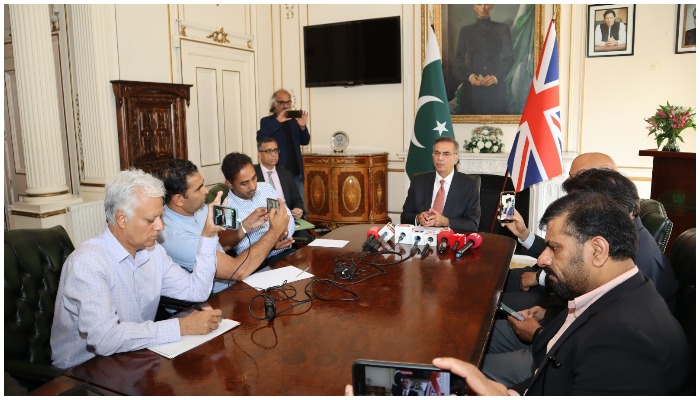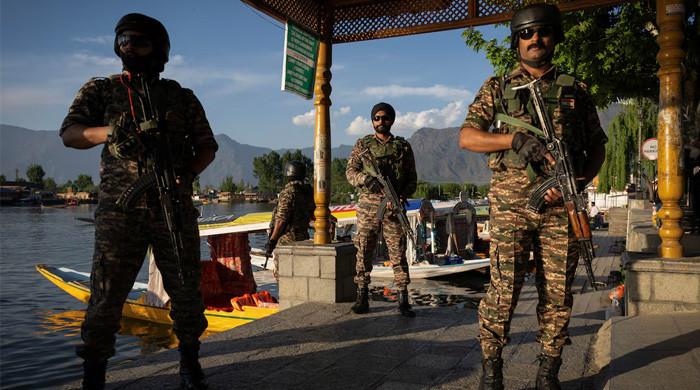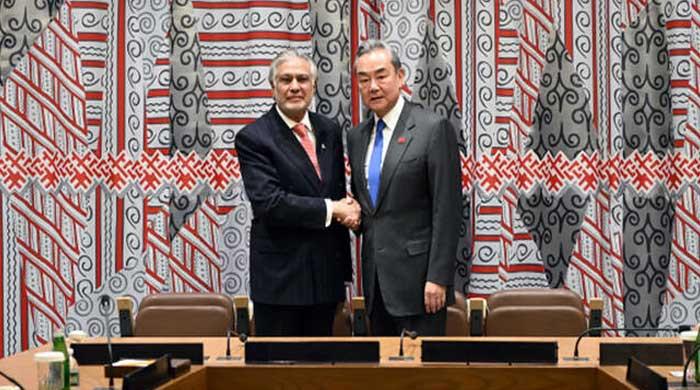Pakistani envoy slams UK's assessment approach to Pakistan's red listing
"UK has adopted the wrong approach to assess Pakistan by ignoring science & data," says the Pakistani high commissioner
August 10, 2021

- Pakistan's High Commissioner to the UK says he's optimistic that the country's name will be struck off the red list on August 25.
- Pakistani community in Britain had criticised the Pakistani govt for not launching "robust diplomatic efforts" to get country off the red list.
- Says the Pakistani govt had been sharing the latest COVID-19 and vaccination data with the UK govt on a weekly basis.
LONDON: Pakistan's High Commissioner to the UK Moazzam Ali Khan has said that Pakistan respects the British Government's sovereign decision to keep Pakistan on the red list but the UK has adopted the "wrong approach to assess Pakistan by ignoring science and data."
Addressing a press conference in London, Khan told the Pakistani media that Pakistani authorities shared data on a weekly basis with the UK government but it seems to have ignored the data while deciding to keep Pakistan on the red list.
"I am optimistic that Pakistan will come out of the red list on August 25," said the high commissioner.
The High Commissioner spoke after mounting criticism from the Pakistani community that the country did not launch robust diplomatic efforts to get out of the red list while India and several countries managed to get out.
The Pakistani community was upset with the government after The News published a report, citing UK government sources and five British Pakistani MPs, that Pakistan did not provide data to the UK government relating to the COVID-19 vaccination drive.
On the other hand, the Federal Minister for Human Rights Shireen Mazari slammed the UK government for keeping Pakistan on its red list of countries facing travel restrictions, saying that the UK never asked Pakistan for data related to the country's coronavirus situation to review its decision.
But Khan said that Pakistan provided weekly data to the UK government and that the decision to keep Pakistan on the red list was “shocking” for the High Commissioner.
“There is a general impression that Pakistan did not provide the required information to the UK. We reject that impression. Throughout, Pakistan engaged with the UK government at the highest end and working level, he said.
He added that the High Commission remained engaged with the Foreign, Commonwealth and Development Office and there was no communication breakdown.
"We have been sharing the latest data on a weekly basis,” he said.
Khan further said: "We have reservations and concerns. We respect the UK's sovereign decision on the matters of safety and security as it is their sovereign right but we understand that the system that has been adopted to assess Pakistan does not present the true and factual situation of Pakistan. That needs to be corrected. We have requested the UK government that both sides should deal on a technical basis so that the decision should be made on the basis of science and data."
He said that Pakistan believes that the UK's assessment system needs to be corrected and improved.
"We have reservations and concerns about it but it's not just us, there are concerns about this system within the country that this is not amongst the best systems to assess a country's situation. Our data is available on the NCOC sites and can be accessed easily.”
The High Commissioner said that he did not want to comment on the meeting between Asad Umar, Faisal Sultan, and eight British Pakistani MPs but said that the MPs told the meeting that “Pakistan was in safe hands”.
The High Commissioner said that he had met the UK PM Boris Johnson at the Military Academy Sandhurst where he raised the issue of Pakistan's status on the red list. The envoy quoted the UK premier as saying that he will "look into the matter" but provided no assurance.
“I told PM Boris Johnson that the Pakistan community is frustrated and disappointed at the decision to keep Pakistan on the red list.”
The News had reported on Monday that a senior UK minister has claimed that the Pakistan authorities didn’t share with them the COVID-19 data on vaccination and testing and that’s the reason why Pakistan remains on the travel ban red list. Meanwhile, India and several other countries have been moved out of the ban list into the amber category.
The Department for Transport explained that the traffic light system for categories for countries/territories is based on risk to protect public health in the UK and the vaccine rollout from variants of COVID-19.
“Key factors in the JBC risk assessment of each country/territory include genomic surveillance capability, COVID-19 transmission risk, and the variant of concern transmission risk.”











